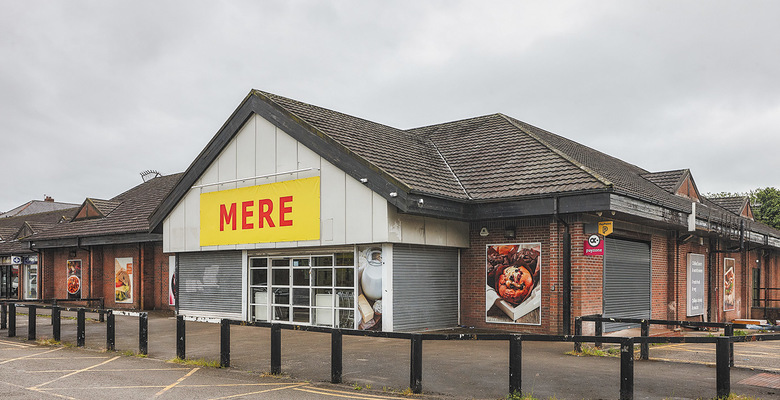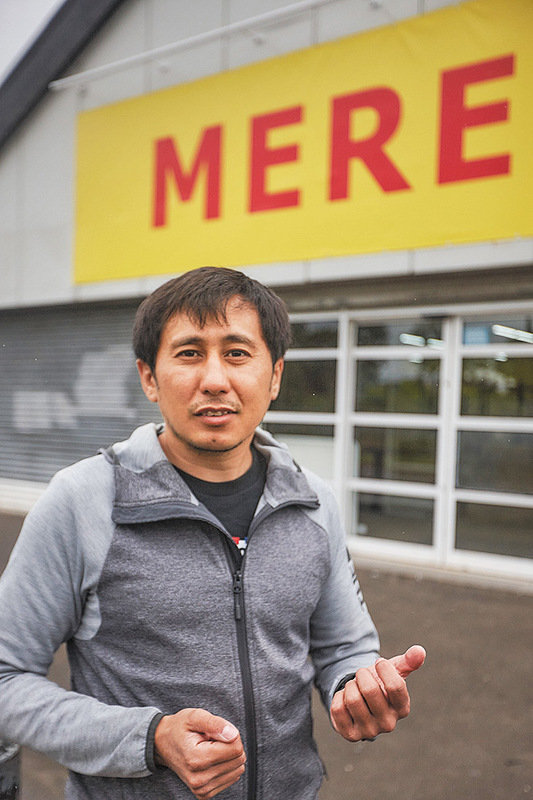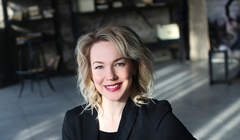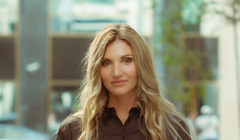
The head of British operations for the Mere supermarket chain, Alexandr Chkalov tells me of the competitive advantages of his stores, which have already been dubbed the ‘Russian Lidl’. He discusses the business ideas of the new discounter and of the key ways that Mere’s business model stands out to make the chain unique, not only in Britain but around the world.

Mere has more than three thousand outlets around the world. Last year the chain came to the UK market, where the discount supermarkets Aldi and Lidl are already present. What is the main competitive advantage the company has?
Our competitive advantages are not so much about what the customer sees, they are more about the organisation of the business and how we do things. The main advantage we have is our experience of work, including work in Russia. Mere is a British company, but it benefits uniquely from Russian experience. Having worked a little in Europe, where there is generally a more favourable environment for business, I have to say that you can begin to get a bit lax. It seems to me that any Russian company which has been successful back home should do well in Europe. That’s because they've stood the test of the Russian business reality. It’s that stock of experience gained in Russia which helps us to create solutions which seem impossible to our European competitors.
The flexibility of the Russian economy, the sudden changes
All these factors don’t just make businessmen stronger, they force them to find solutions quickly and well. When you arrive on a different market, you’re ready for all kinds of events, whereas often, the locals aren’t.
Is the British market different from Europe?
It can’t be completely different as people are the same everywhere- they all need to eat and buy everyday items, but every market has its own nuances, Britain included. Some things we’ve encountered before in other countries, other things are new to us, but our company adapts fast.
The main peculiarities which make markets stand out are cultural. For example, in many countries they don’t eat buckwheat, but in Russia it’s product number one. As far as business is concerned, the details that make up work on the market are all quite subtle and marked differences are hard to put a name to. When you open a business, you encounter differences in the legal framework, but I can say that in Russia, these rules vary from region to region. So overall, for me personally there isn’t much difference. I’m at home working on the Russian, British and European markets.
Who would you name among your direct competitors?
I wouldn’t say that we have any. Aldi and Lidl compete with us, since they have a similar format and business model, as well as targeting the same market segment. We’re different from them and they’re different from us, and I’d say quite markedly different. That’s because we never offer the service that British discounters provide, while it’d be difficult for them to offer customers our low prices. I’d say we have two completely different formats, which is why we’re not really competing with them. The main thing is that we don’t really need to.
How will you attract British customers?
Most of all with our prices, as we do everywhere. Our unique selling point is having the lowest prices on the market. That’s why customers come to us. They also understand that they’ll get decent service and convenience. Our shops are self service, more precisely, they’re self service warehouse-shops.
Are British customers different from Russian ones in terms of the volume of purchases they make or the marketing techniques that attract them (such as discounts and bonuses, for example)?
As far as prices are concerned, I think the inhabitants of most Russian regions, with the exception of European and Central Russia, are required to seek out the absolute minimum prices as they have rather low incomes. Their drive to buy things cheaply is mostly due to economic factors. This factor is also present in Britain, however it is not due to the low income of the population but rather because of the high level of prices, which leads people to try to cut costs. This variable is important for customers. The British are used to counting every penny, not only when making a purchase, but also, for example, when paying for utilities etc. Economies can be made everywhere, which is different to the situation in Russia.
Volumes of goods consumed are quite similar, but financially, due to the higher level of prices, the bottom line here is a larger sum. It follows that the average basket of goods in England is significantly more expensive than in Russia. But I see no fundamental differences.
How is the Mere range selected?
If we look at categories, we focus most of all on groceries and everyday essentials. Other goods are secondary and their presence is optional. For this reason the full content of our range depends directly on prices. Only products which have gone through price control appear on our shelves.
On the internet, we can read that Mere is proud of the simplicity of its business model, which it compares with that of Costco Wholesale (the world’s largest self-service membership-based warehouse chain, which is the 5th largest retailer in the US- Ed). How much does this reflect reality?
It’s possible that analysts, experts or the employees of other companies have made comparisons like this. As we know the internal workings of our company, we understand that it is intrinsically different from all the rest. As for Costco, I can see a huge gulf between our formats. First of all, Costco works in the B2B segment, in retail for business. Mere is focused on the B2C segment; on the end customer. Secondly, the average shop space of this American retailer’s stores is ten times greater than ours (they can be up to 1,000 square metres). Our discount stores just don’t need such vast areas of shop floor. Thirdly, Costco has greatly expanded its range, they have an enormous number of subcategories, far more than the average retailer; domestic appliances, jewellery and so on. We focus on the fundamentals. Fourthly, Costco provides services which I feel are completely incompatible with the discount store format. Fifthly, there are significant differences in the distribution of their stores around the country compared to our network. Mere aims to be accessible to the end consumer, whereas this is not a priority for Costco as they target a different market segment.
Do you study a market when you move into it? How do British discount supermarkets work, and how does their business model differ from yours?
It’s impossible to exhaustively study the business model of every competitor due to time limitations, and besides, we can’t see their operations from the inside. The internal working of companies are commercial secrets which are the basis of everything they do and determine their success. As we can’t study our competitors satisfactorily, we analyse the environment instead. On entering a new market, we see if our business model can be successful in the local conditions or not. How flexible are local producers, suppliers and distributors? How welcoming are the state authorities to foreign businesses? Is there demand among end consumers for low cost supermarkets? Studying the field of play gives you far more information on how to launch your business on the market than can be gained from studying the competition. Comparative analysis of business models is pointless for us. Our business model is is as simple as it gets, we have the lowest prices on the market, by a margin of at least 30%.
You make savings in many areas such as marketing and brand promotion. Is that right?
Yes, that’s right. Our main advert is our prices. And as a rule, after we open a shop, growth in demand makes a geometric progression, simply thanks to the grapevine. When customers come to us and see prices that they didn’t expect, natural growth in our brand recognition in the region occurs. We are focused on the local community, people who find it convenient to get to us. That's why we don’t need specific advertising.
When you choose a location, do you concentrate on the potential demand amongst local end consumers? Does that mean that you try not to open your shops close to other discount stores? Or does the presence of these stores in the neighbourhood not play a role in your selection process?
We can work next door to any retailer in any country in Europe. This is because the client flow will in any case at least partially redirect itself to our shops.
Is there anything different about working with British producers and distributors? For example, are they ready to lower their prices for high volume orders? In other countries your chain has high customer footfall.
I wouldn’t say that British producers are any different. It’s difficult to launch on a new market anywhere. What’s more, our brand is completely unknown to them, we’ve no aces up our sleeves, and nor can we order high volumes yet. We’re starting small, we plan to open two to four stores by the end of the year (2021), in comparison with other countries, that’s no scale at all. Nevertheless, we have to work with the local suppliers and distributors. Growth is a gradual process, from the initial virtually impossible conditions, we’ll make the transition to the usual format for our chain. But whilst we’re on the launch stage, practically everyone on our team is doing the impossible, from the purchasing department to research and development, even the back office. It’s difficult, but it’s worth it.
You are a businessman who has worked in Russia. What do you think; are there differences in how businesses are run in the UK?
There are differences. There is a noticeable difference in culture and mentality. Russians are used to doing things differently. We are faster, more open to partnerships and proposals. It seems to me that the Russian way of doing business is much more effective. In Britain there is a different approach; everything is very slow, there is less openness and mutual trust and there is a high chance of some insurance issues coming up which slow progress. Relations with partners here are more bureaucratic and you need more documents. In Russia a verbal agreement, at least in my experience, is more important than having something in writing. Here it’s different, and we have to get used to it. For deeper analysis, first we need to spend longer on the market, expand to a certain size and achieve success, then we’ll be able to say which market is more challenging to work on and which is easier. But for me the question of which market is tougher is the wrong one. It’s easy and interesting to get on anywhere, if you can.

The British are a conservative people. How is this national characteristic reflected in their shopping habits? Is it harder to get them to switch to new brands and products? How flexible are local consumers?
Everything depends on hitting the right target in one category or another. If we are talking about goods which are basically the same in price, quality and other features, then the British, like people from other countries, have a preference for the brands they know. This happens everywhere, it’s no secret. For us, branding is of secondary importance, as having the edge in competitive pricing is more important. I see this fondness for tradition in Britain, amongst the public and businessmen, but I wouldn’t say that it plays a decisive role in business. It’s a big part of the culture, a unique feature of the country which is passed down from generation to generation. It creates a special atmosphere, but it doesn’t really affect how business is done here.
So pricing will be your most enticing feature…
And after that, the question is whether the customer liked our store on the first visit. After first contact is made everything depends on providing value for money.
Your first supermarket will open in July in Preston. Then, over the next five years another two hundred stores should appear. Does this mean you plan to open Mere stores all over the UK?
These are the plans the company has made for itself. Now we need to get started. We’ll launch the first shops and then scale up to expand all over the country. I suppose these targets are not absolute. We see sufficient capacity in the country and we understand that soon we’ll be able to open two or three hundred stores.
Authors






